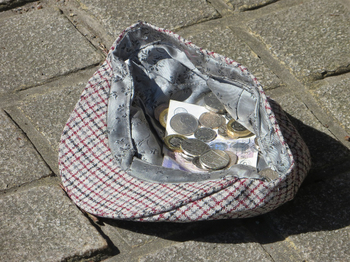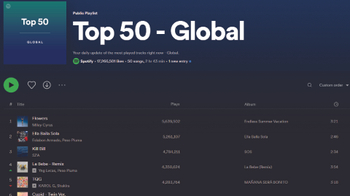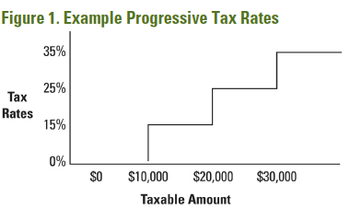 |
| |||||
                  | ||||||
 |
| |||||
                  | ||||||
Spotify, the IKEA of music streaming (get it? Because they are big and Swedish?), has transformed the way we consume music. But has it really been that positive change for the industry? Or is it just a legalized version of Napster that doesn't represent much improvement over it?

For context, Napster was the infamous peer-to-peer file-sharing platform that was shut down in 2001 due to copyright infringement issues. At the time, the music industry was up in arms about the platform, arguing that it was hurting artists by enabling widespread piracy. I get that coming from artists themselves but when it comes to the industry itself, their real concern wasn't the potential damage to artists; it was the threat to their own bottom line.
Fast forward to today, and we have Spotify – a legal music streaming platform that shares many similarities with Napster. While it's true that Spotify has made it easier for listeners to access a vast library of music, it's essential to examine the platform's business model and its effects on both the music industry and artists.
The way I see it, the main beneficiaries of Spotify's current model are the platform itself and the recording companies. Smaller artists often make little to no money from their streams, as Spotify pays them a meager share of the revenue. This system not only devalues the artists' work but also perpetuates the power imbalance between the industry giants and independent creators.
According to a report by Soundcharts, Spotify's average payout per stream is between $0.003 and $0.005. To put this into perspective, an artist would need at least 1 million streams to earn around $3,000 to $5,000. As a result, only the most popular artists with millions of streams can make a sustainable income from Spotify royalties.

Napster, not unlike buying records and cds, also required a proactive approach from listeners to find new artists and explore their discography. In contrast, Spotify's playlist-driven system encourages passive listening, where we, the users, often don't bother to venture beyond the curated playlists because we're lazy, and as a result we're rerely exposed to artists outside of the huge ones and those who have artificially inflated their numbers using stream farms.
And because Spotify's algorithms prioritizes number of streams over anything else, listeners are less likely to be exposed to new artists. This creates a self-perpetuating cycle where popular artists continue to dominate, making it more difficult for emerging talent to break through.

Spotify's model has huge consequences for the music industry. By favoring the major recording companies and perpetuating a system that devalues the work of independent artists, the platform has essentially created a new hierarchy. While the big players continue to profit, smaller artists are left struggling to make a sustainable income and gain recognition.
As mentioned earlier, the way Spotify's algorithms work, has caused the the rise of stream farms, where artists or record labels pay for fake streams to boost their numbers. This practice not only manipulates the platform's algorithms but also further undermines the value of genuine streams and the hard work of legitimate artists.
Stream farming is a symptom of a broken system, where the number of streams (and probably payouts from recording companies) are prioritized above everything else and where Spotify themselves don't care because that really doesn't affect heir bottom line and makes the numbers look good to their investors, and with artists struggling to gain exposure and earn a decent income from their work, the temptation to resort to such tactics is understandable. However, it ultimately serves to exacerbate the existing problems within the music industry and further dilute the significance of streaming numbers.

Look, I use Spotify like everyone else, I'm lazy and it's super practical, and it's legal, so you don't feel as guilty using it. But with the problems outlined before, are artists that much better off with Spotify compared to piracy?
As long as money is being made or as there's potential of money being made, and the fact that our consumer habits are unlikely to change because we suck, we can't expect anything to change.
Good or bad though, I think Spotify still was a step in the right direction given the huge changes we had in the way we consume music when internet usage started increasing and peer-to-peer started becoming a thing.
And users don't have to worry about being cracked down on for consuming music in a convinient an cheap way.
I believe Spotify should increase the share of revenue paid to artists and make improvements on how artists are suggested to users, as well as maybe cracking down on streaming farms and increasing account security so people's accounts aren't taken over to be used in those farms.

But Spotify is a for-profit company designed to support other for-profit companies, meaning we can't really expect any of those changes are gonna be made, so maybe, at the very least they should use a similar approach to progressive taxing, where you get a bigger chunk of the revenue taken by Spotify when you are bigger as you can afford to have more money taken and have smaller artists gaining an increase on how much they are paid as their streams don't affect the industry's bottom line much regardless if they get 0% or 100% of the revenue from their streams.
Also, as a consumer, make sure to support small artists by buying merch or contributing on Patreon and other similar ways.
And maybe also make an effort to discover artists outside of playlists, because maybe you'll find something cool and new that you never imagined that you could find!
Anyway, what do you think? Do you agree? Leave a comment below sharing your opinion.
Thanks!


